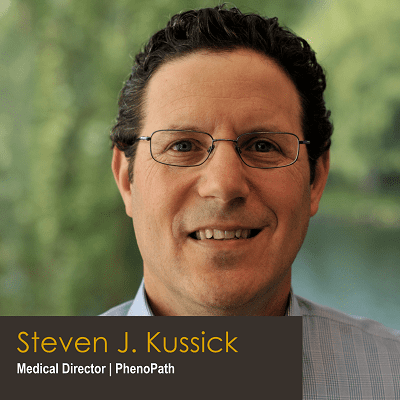Talent for Good Interview Series: Steven J. Kussick
At Brighton Jones, giving back through time and treasure is a core part of how we operate. In this series, we highlight members of our community who put their professional talents to use to help make the world a better place.
We hope their stories inspire you! If you would like to share your own, please reach out to our philanthropy team.
Steven J. Kussick – Medical Director | PhenoPath
What do you do professionally?
I serve as the medical director at PhenoPath, a Quest Diagnostics Company. As a physician specializing in hematopathology, I focus on the diagnosis of blood-related cancers such as leukemia and lymphoma. I’m also an affiliate faculty member in the Department of Laboratory Medicine and Pathology at the University of Washington.
I earned my MD and PhD degrees in the Medical Scientist Training Program at the UW and did an anatomic pathology residency and hematopathology fellowship at the UW. I’m board-certified in anatomic pathology and hematopathology.
When did you realize you could use your skills to give back beyond your day job?
In 2010, when I was introduced to Miriam Sevy, a retired Seattle financial advisor who had just created a non-profit called the Burkitt’s Lymphoma Fund for Africa (BLFA), I realized that my skill set put me in a position to help advance the cause of global health. Burkitt’s lymphoma is an extremely aggressive cancer common in young children who live in the “malaria belt” of sub-Saharan Africa. In 2009, Miriam took a trip to western Kenya. She visited a hospital cancer ward where children with the potentially curable disease received only pain control as they waited to die, since no lifesaving chemotherapy was available to treat them.
Miriam was so affronted by their suffering, and by the generally poor state of cancer care in Africa due to the focus on infectious diseases, that within one year she had founded BLFA, registered it as a 501(c)(3) organization, and created a board of directors. By 2012, BLFA had awarded its first three grants to help fund treatment in Kenya, Uganda, and Tanzania.
Miriam quickly learned that delayed and/or inaccurate diagnosis was a major challenge to cancer care in the developing world. Knowing I had particular expertise in diagnosing Burkitt’s lymphoma, she kept me informed about BLFA’s work and recruited me to the board in 2013 to lead BLFA’s Pathology Improvement Program (PIP).
What are you learning? What are the challenges?
Attempting to make sustainable improvements to a technically-demanding endeavor like cancer diagnosis, especially in a resource-limited part of the world, is fraught with hurdles. First among our challenges is securing adequate funding. The second is training local medical personnel to perform and interpret the testing. Finally, we must overcome significant logistical hurdles to deliver hardware and consumables as needed.
Perhaps the greatest lesson learned is that with appropriate collaboration, these hurdles can be overcome. In the case of PIP, which successfully helped launch new leukemia/lymphoma diagnosis laboratories in late 2018 at the Uganda National Health Laboratory Service in Kampala and the AMPATH Reference Laboratory in Eldoret, Kenya, these collaborations have included African academic medical centers (the Uganda Cancer Institute in Kampala and the Moi Teaching and Referral Hospital in Eldoret), American academic medical centers (Fred Hutchinson Cancer Research Center and Indiana University for Kampala and Eldoret, respectively), and large corporations (Beckman Coulter).
If all stakeholders are pulling in the same direction, then the achievement of initially-aspirational goals, like transforming cancer diagnosis about 8,000 miles away, suddenly becomes possible.
Steven J. Kussick serves as the medical director for PhenoPath.
Read more from our blog:





